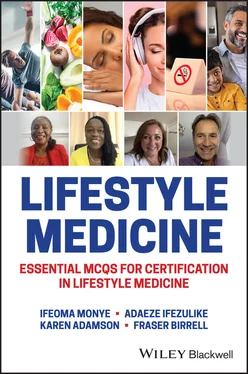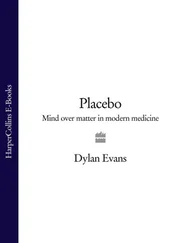1 A In the Action stage of behaviour change, the person has been making a change in the last six months (Hashemzadeh et al. 2019; Selçuk‐Tosun and Zinci, 2019).
2 C Governmental policies do not play a key role in the Health Belief Model. The model explains that before one will seek preventative measures, he must first believe there is a threat to his health and a preventative measure that is accessible and low risk that will enable him to avoid the health threat (Stokols and Zmuidzinas 2000; LaMorte 2018; Sheppard and Thomas 2020).
3 B Intrapersonal factors like one’s knowledge, attitudes, beliefs, and personality influence their health behaviour in addition to other influences like interpersonal factors, community factors, and public policies (LaMorte 2018; Beauchamp et al. 2019).
4 B Any change being contemplated within six months is at the contemplation stage (Hashemzadeh et al. 2019; Selçuk‐Tosun and Zincir 2019).
5 A For a person at the precontemplation stage, you can only discuss the health benefits of a healthy lifestyle in general terms (Hashemzadeh et al. 2019; Selçuk‐Tosun and Zincir 2019).
6 C The person at the action stage has been making a change within the past six months (Hashemzadeh et al. 2019; Selçuk‐Tosun and Zincir 2019).
7 C Making available a readiness assessment for patients to complete in advance in the waiting room, documenting behaviour change plan in every patient’s health records at each visit and reviewing the patient’s completed readiness assessment form to prioritize lifestyle areas which the patient is most ready to address are tips a clinician could use to facilitate health behaviour change (Kelly and Shull 2019, p. 41; Tips Box 2.1). TIPS BOX 2.1Factors Influencing Health BehaviourA person’s health behaviour is influenced by:Intrapersonal factors such as his knowledge, attitude, beliefs, and personalityInterpersonal factors such as influence of peers, health providers, friends, and familyInstitutional factors such as the community norms and public policiesSource: Kelly and Shull (2019).
8 B Social Learning theory explains ‘reciprocal determinism’ in which the patient, the behaviour, and the environment all influence each other (Chen et al. 2015; Beauchamp et al. 2019).
9 B Self‐efficacy as well as motivation, beliefs about risks and benefits of change and Social Norms are things key behaviour theories have in common (Kelly and Shull 2019, p. 40).
10 B Positive psychology, Motivational Interviewing, and Cognitive Behaviour Techniques are useful skills in facilitating the behaviour change process. Motivational Interviewing is most helpful at the early stages of change (Miller and Rollnick 2012; Soderlund 2018).
11 A In the precontemplation stage, the patient is not thinking about making a change at all now or within the next six months (Hashemzadeh et al. 2019; Selçuk‐Tosun and Zincir 2019).
12 B Stage‐matched interventions must be appropriate to the person’s readiness to change to encourage adherence (Crespo et al. 2019; Hashemzadeh et al. 2019; Selçuk‐Tosun and Zincir 2019; Tips Box 2.2).
13 D Ideally, the plan for change should be dictated by the patient. However, the doctor acts as a coach to facilitate this. Family support, if available and positive, can help facilitate changes in health behaviour (Kelly and Shull 2019, p. 42).
14 A Assessing readiness and confidence levels are appropriate. CBT is used at later stages of change. Lifestyle prescriptions are not specific to each patient and general advice is best used at the precontemplation stage which this person has already passed (Kelly and Shull 2019, p. 41).
15 B This is the precontemplation stage and it will be appropriate to raise the issue at another consultation as the patient may have changed his mind. Exploring his health beliefs and providing general healthy lifestyle advice are appropriate (DiClemente et al. 1991; Stewart and Fox 2011; Crespo et al. 2019). TIPS BOX 2.2Stages of ChangeTechniques such as Motivational Interviewing, Cognitive Behavioural Therapy (CBT), and Positive Psychology are used to assist patients in the behaviour change process:In the early stages of change (precontemplation and contemplation stages), Motivational Interviewing is helpfulIn the preparation, action, and maintenance stages, CBT is most usefulAll stages of change can benefit from Positive PsychologySources: Hashemzadeh et al. (2019) and Selçuk‐Tosun and Zincir (2019).
16 D In a person who is already making changes, CBT skills are useful in addressing any unhelpful thought patterns (Keles and Idsoe 2018; Trifu et al., 2019; Beck 2020).
17 D Positive psychology is used at all stages while Motivational Interviewing methods come in handy in the early stages (Wong 2011; Fredrickson and Joiner 2018).
18 A An assessment of the patient’s confidence in the key areas of lifestyle change such as stress management, nutrition, and physical activity is helpful and forms the basis of the subsequent discussion when they go in to see the clinician (Kelly and Shull 2019, p. 41).
19 D The person’s confidence in managing the change is a key factor in determining their ability to accomplish the goal (Bandura 2010; Ha et al. 2018).
20 D A healthcare provider uses the health assessment tool to prioritize areas for discussion as highlighted by the patient’s responses in the questionnaire (Kelly and Shull 2019, p. 41).
21 A A hug may be unprofessional, and the patients should be encouraged, not compelled, to write down their goals (Hicks and McCracken 2009; Frates and Bonnet 2016).
22 A Better HbA1c control is the correct study outcome in the list. The study demonstrated that empathy is a clinically important factor in patient outcomes (Hojat et al. 2011).
23 B 10‐hour training on empathy skills achieved the same result as longer training and had a positive effect on the consultation (Lewin et al. 2001; Dwamena et al. 2012; Boissy et al. 2016).
24 B While the other options may have a role to play, identifying the patient’s concerns and applying positive psychology are key aspects of a successful consultation (Boissy et al. 2016; Fredrickson and Joiner 2018).
25 D Sharing personal examples where disclosure would support a patient’s journey is a useful skill in coaching (Kelly and Shull 2019, p. 53).
26 C The 5 As approach to health behaviour counselling are Assess, Advise, Agree, Assist, and Arrange follow‐up (Whitlock et al. 2002; Jay et al. 2010).
27 B The 5 As approach can be used as a brief health behaviour counselling or as part of longer ongoing counselling (Whitlock et al. 2002; Jay et al. 2010; Stewart and Fox 2011).
28 C While writing down treatment plans is useful, this is not appropriate in the precontemplation stage, whereas positive psychology is important at every stage (Alexandrova 2017; Fredrickson and Joiner 2018).
29 A The ability to develop discrepancy between where the patient is and what the patient wants is a key skill in motivational interviewing. The other key features are expressing empathy, rolling with resistance, and supporting self‐efficacy (Miller and Rollnick 2012; Soderlund 2018; Tolchin et al. 2019).
30 A The cause of obesity is complex. It is a sensitive topic, and it is helpful to check the patient’s weight in private (Kelly and Shull 2019, p. 55).
31 A All or nothing thinking is unproductive. The other options are not recognized thinking patterns (Trifu et al. 2019; Beck 2020).
32 C ‘Should’ and ‘must’ statements are features of unproductive thinking (Trifu et al. 2019; Beck 2020).
33 D Cognitive Behavioural Therapy (CBT) helps patients unmask underlying beliefs that affect behaviour change. Positive parental input is encouraged. Reframing thoughts to support behaviour change is important (Trifu et al. 2019; Beck 2020).
Читать дальше












